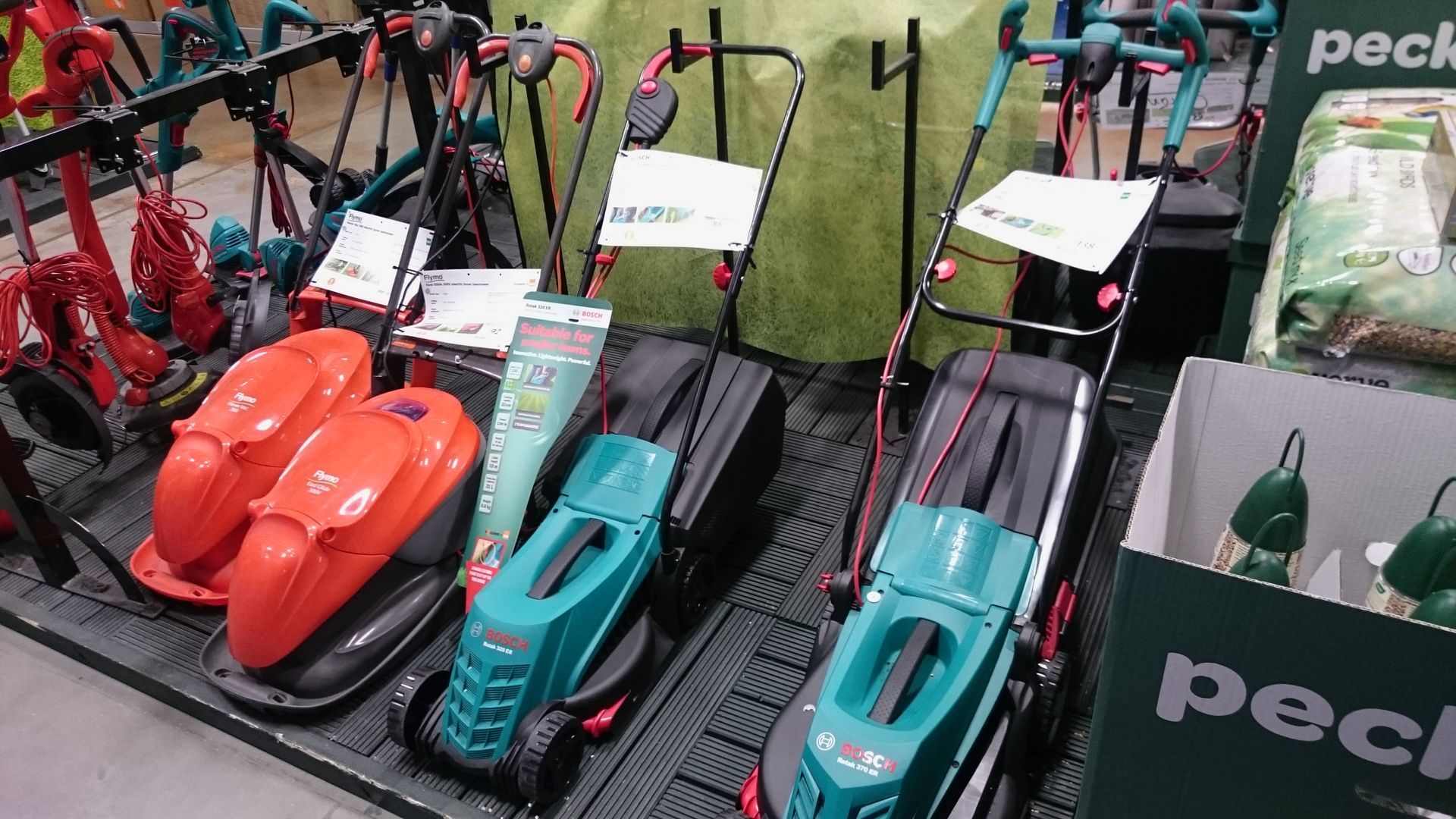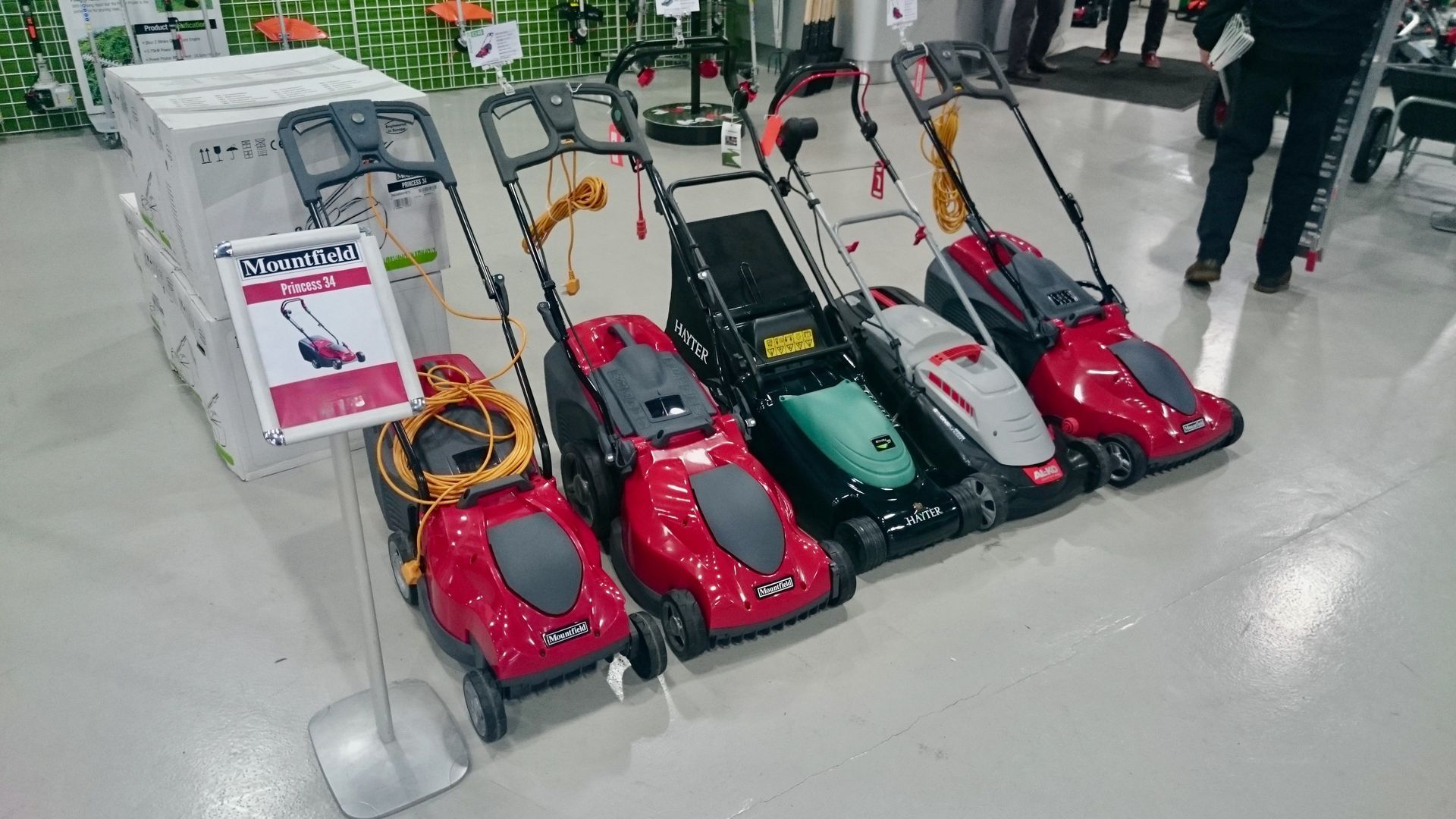*Important Information: As an audience supported website, if you purchase an item after clicking an external link or advertisement marked with an asterisk (*) on this website, we may receive a commission. This does not change the price you pay.
Electric mowers, such as the Rotak model from German engineering giant Bosch, are a frequent site on British lawns. Image Credit: Pixabay
Corded Electric Mowers
There are more corded electric mowers in the UK, than any other. Affordable, lightweight and easy to use, electric mowers have much to recommend them.
Electric machines are available in a wide variety of styles. Almost every major manufacturer today includes electric powered models within their range.
Electric mowers, such as this Rotak model from German engineering giant Bosch, are a frequent site on British lawns. Image Credit: Pixabay
Today’s electric lawnmowers come in a wide range of models, to suit many different garden types and mowing preferences. These include wheeled rotary mowers, rear-roller mowers for that striped finish, hover mowers for uneven or sloped lawns, and even electric-powered cylinder mowers, for precision cutting on fine lawns.
While the majority of electric mowers on the market are manual push-type models, innovation in the sector is expanding the possibilities. For instance, UK garden machinery specialists Henton & Chattell, now offer a self-propelled, corded electric mower — the Cobra GTRM43 —which features an 18-inch cutting width, and integrated rear roller for added flexibility on medium size lawns.
Electric Advantages
With quality models starting from around £120, and advanced commercial-grade units commanding significantly more, electric lawnmowers remain the preferred choice for many British gardeners, and for good reason. From ease of use to environmental performance, modern electric mowers deliver a compelling mix of power, simplicity, and low running costs:
- Less of a handful: Compared to manual hand mowers, electric machines offer significantly greater cutting power — especially useful when tackling denser and overgrown lawns. Many corded electric models can power through grass that would stall or jam a hand powered mower;
- Lower purchase cost: While top-tier electric mowers can still be a substantial investment, most entry and mid-range electric models cost considerably less than equivalent petrol and battery electric machines. For homeowners seeking dependable performance without breaking the bank, that’s a major advantage;
- Lower operating costs: Corded electric mowers are also cheaper to run, than a comparable petrol machine. With no petrol to purchase — and no oil, spark plugs, or filters to replace — ongoing costs are minimal;
- Get off to a great start: If you're used to petrol machines, electric mowers eliminate the requirement for fuel priming and pull starts. With a corded electric mower, starting the machine is as simple as plugging it in and pressing a button and pulling a trigger;
- Less maintenance: Electric motors are inherently low-maintenance. There’s no internal combustion engine to service, meaning no oil changes, and no filters or spark plugs to replace. Aside from periodic blade sharpening and routine safety checks, maintenance is refreshingly minimal;
- Reduced vibration: Vibration exposure is another often-overlooked benefit of choosing an electric mower. Electric mowers — particularly those with brushless motors — generate significantly less vibration than petrol equivalents, enhancing comfort during use and reducing fatigue during longer sessions;
- Lightweight and manoeuvrable: Electric motors are generally more compact and lighter than petrol engines. This gives electric mowers a lighter overall footprint, making them easier to manoeuvre around tight spaces and garden features, transport and lift, and to store in sheds, cupboards, or garages;
- Zero emissions at point of use: Electric mowers produce no exhaust emissions during operation — a major win for environmentally conscious users. Pair one with a green electricity tariff, and you’ve got near-zero carbon mowing with none of the smell, fumes, or mess of petrol;
- Convenient storage: With no fuel or flammable vapours, electric mowers are safe to store indoors, making them ideal for small homes, flats, and anywhere external storage space is limited;
- Choice: British gardeners can choose from a wide range of electric mower types, with a model to suit nearly every lawn - aside perhaps from the very largest.
Electric lawnmowers combine ease of use, low maintenance, and near-zero emissions, in a package that’s both practical and affordable. Whether you’re looking for quiet operation, reduced maintenance demands, or simply a mower that 'just works', a corded electric machine might just be the mower you're looking for.

With the exception of very large lawns, there are electric mowers to suit almost every lawn and budget. Image Credit: Author

Despite the prevalence of petrol mowers and the increasing popularity of cordless electric machines, corded electric models still retain a significant following among British gardeners.
Image Credit: Author
Electric Disadvantages
But just like every other power source, electric machines have their disadvantages too:
- Power: In many instances, electric mowers are not as powerful as an equivalent petrol-powered machine. Some electric mowers may struggle in areas of longer and denser grass;
- Cord: Rather obviously, electric mowers require a power cord. Unless you’re extremely careful, it can snag around plants, garden furniture and ornaments – making for a more awkward and time-consuming cut. The cord is also a potential trip and electrocution hazard. Using a Residual Current Device (RCD) or a suitably protected socket, is essential, to minimise the risk of electrocution should an electrical fault arise, or if you accidentally cut the cable;
- Mains dependency: Because electric mowers require a power socket, they are unsuited for use in areas without mains power. Before purchase, you’ll almost certainly wish to measure the length from your socket to the farthest point in the garden, to make sure the cable will reach. Otherwise, you’ll have to consider an extension lead or the installation of an additional socket;
- Repairability: The use of an electric motor reduces servicing and maintenance costs. However, should the motor fail outside warranty, many electric machines will be beyond economic repair. By contrast, petrol engines can often be repaired or replaced for less than the replacement value of the machine;
- Performance on damp lawns: Nobody would suggest you cut the grass in wet weather using any kind of mower. Aside from the potential risk to personal safety, a poor finish is a certainty. But whilst some petrol mowers have been purpose designed to handle damp grass with ease, even cutting damp grass with an electric mower is generally ill-advised;
- Lack of choice: The choice of larger diameter electric mowers is limited. Therefore, should you have a larger garden, a suitable electric mower may not be readily available.
Summary
Electric mowers offer a clean, quiet, and user-friendly solution for many domestic gardens — but they are best suited to smaller, well-maintained lawns with easy access to power. For those tackling larger spaces, difficult terrain, or less predictable grass conditions, the compromises of corded electric models become increasingly apparent.
Understanding these constraints will help you determine whether electric is the right choice — or if a battery or petrol model might be a better fit for your garden’s unique demands.
